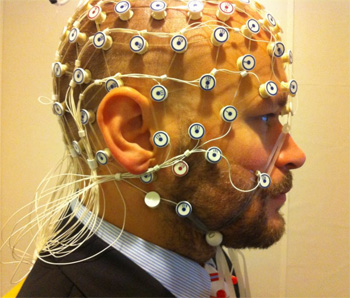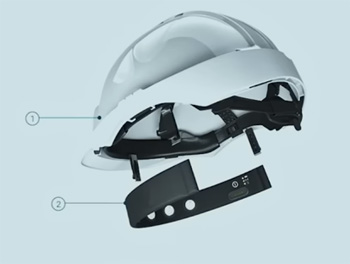Transhumanism & Artificial Intelligence
 |
 |
 |
 |
 |
 |
 |
Spying on Your Brainwaves
At Davos, a futurist spoke in glowing terms about ‘brain transparency’ – and downplayed the obvious dystopian risks
The reptilian annual World Economic Forum at Davos, where the masters of the universe meet to congratulate themselves on their benevolent dictatorship, is home to many sinister ideas. Sharing the latest sinister ideas with business leaders is, in essence, why the event exists. This year, one of the creepiest discussions of all was delivered under the guise of progress and productivity.

Nita Farahany speaking at the WEF on how to control brainwaves; watch her presentation here
According to Farahany, thousands of companies have hooked workers ranging from train drivers to miners up to these devices already, in the name of workplace safety. But what we are really discussing is workplace surveillance.
Farahany paints a picture of a near future in which every office worker could be fitted with a small wearable that would constantly record brain activity, creating an omnipotent record of your thoughts, attention and energy that the boss could study at leisure. No longer would it be enough to look like you’re working hard: your own brainwaves could reveal that you were slacking off.
Farahany acknowledges that there could be drawbacks here: “Done poorly, it could become the most oppressive technology we’ve ever introduced on a wide scale.” Yet, she seems more enthusiastic about the technology’s promise for corporations, saying rather sanctimoniously that the workplace surveillance “bossware” that exists today tends to make employees upset “even when it makes their lives better”. She also displayed a slide showing that nine out of 10 employees say they waste time at work every day, and opined that perhaps there was “good reason” for employers to want to keep tabs on everyone, after all. This is the sort of logic that makes sense to people whose jobs consist of flying to Switzerland for international conferences rather than, say, working at a gas station.

Brain monitoring technology replaced the obsolete harness above, with the discreet helmet sensor, below

It is that fundamental sense of optimism that is, I’m afraid, screamingly naive. One need not be a futurist to divine how this will go. “Bossware” is common today, in the form of less flashy but equally invasive technologies of all sorts: what workers type, what they look at, how long they are “inactive” on their keyboards, how they drive, where they stop, when they apply the brakes, how direct the route they take is.
A Coworker.org database of bossware found that more than 550 products are already in use in workplaces. Everywhere you look, workers are being tracked, watched, measured, scored, analyzed and penalized by software, human overseers and artificial intelligence, with the aim of wringing every last cent’s worth of productivity out of the flawed and fragile flesh-and-blood units of labor who must, regrettably, be used as employees until the robots get a little bit more manual dexterity. The crowning insult of it all is that in most cases, the people enduring the surveillance are paid much less than those who are inflicting it.
All of this raises the question: What exactly is your employer buying when they give you a paycheck? For bosses, the answer is simple: “Everything.” It is a bedrock principle of capitalism that the employer owns the employee. The past several hundred years of human progress can be read as a very slow battle of humanity to pull free of this nightmarish entitlement.
For centuries, of course, employers actually owned people. Even after they were forced to give up slavery, they tried to maintain the greatest possible degree of control. Coal companies owned the houses their workers lived in. The Chamber of Commerce owns local politicians who create the public policy that governs the towns where workers live. And it was long considered routine to fire and blacklist any workers who did troublesome things in their free time, like “talk about communism” or “organize a union”. The sum total of the entire past century’s civil rights laws, labor rights laws and corporate regulations have not been enough to eradicate the firm conviction of business that, when they give you a salary, they are buying your whole life.

Total & perpetual surveillance in a real panopticon
At Davos, Farahany said that neurotechnology in the workplace “has a dystopian possibility.” But that is not stating the case strongly enough. Absent stringent regulation, it has a dystopian certainty. Waiting to see how this all turns out is a very dangerous idea. The biggest mistake you can make with dystopias is assuming that they never become real.

Posted July 21, 2023
______________________
______________________
 Volume I |
 Volume II |
 Volume III |
 Volume IV |
 Volume V |
 Volume VI |
 Volume VII |
 Volume VIII |
 Volume IX |
 Volume X |
 Volume XI |
 Special Edition |


